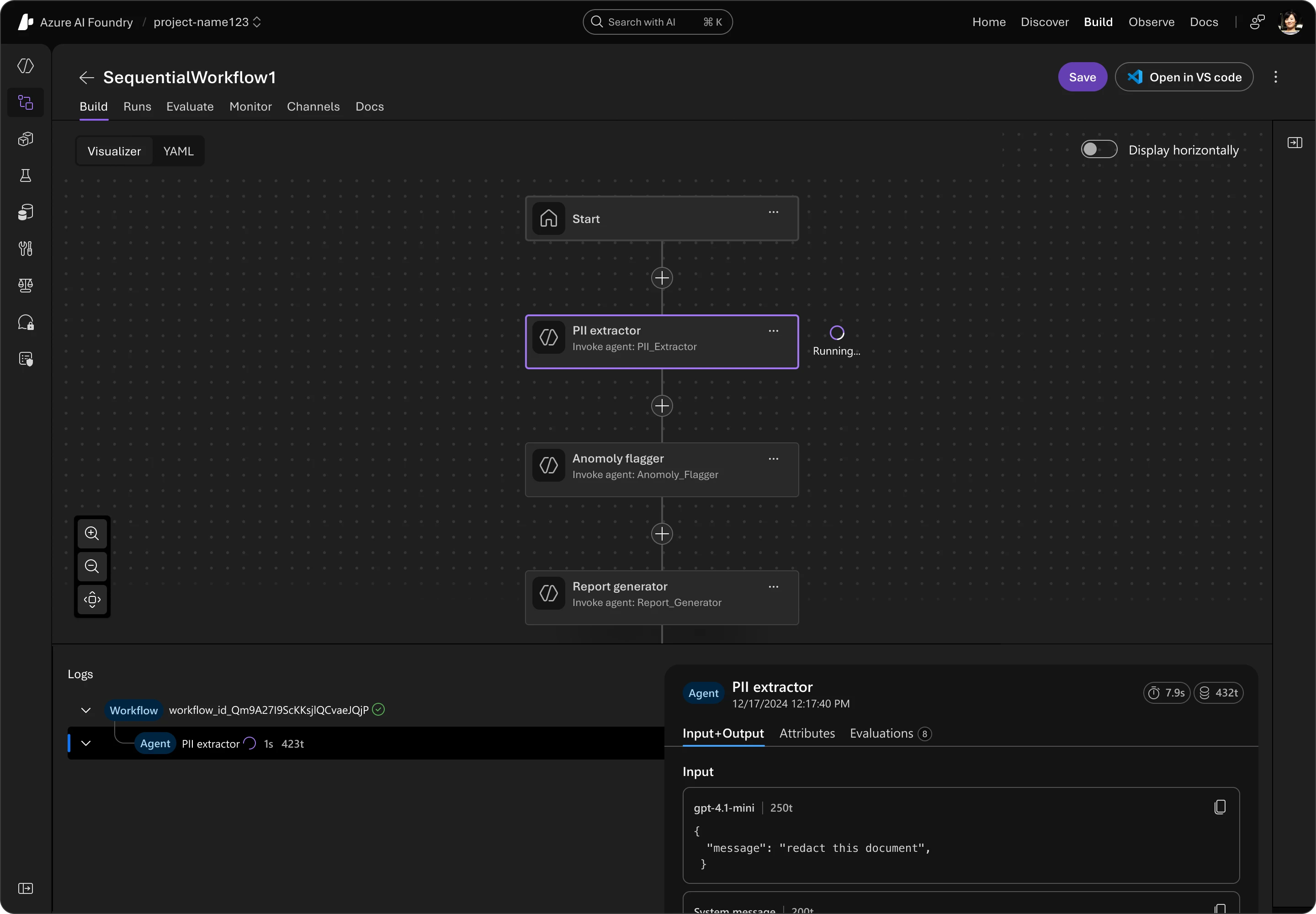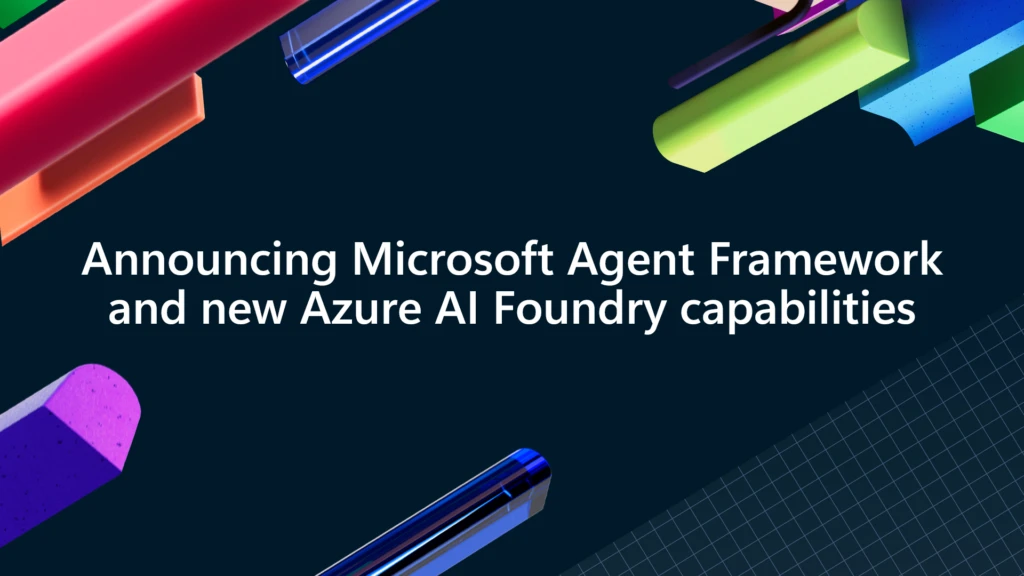Today we’re announcing new capabilities in Azure AI Foundry that make it easier for developers to build, observe, and govern multi-agent systems, while helping organizations close the trust gap in AI.
As agentic AI adoption accelerates—eight in ten enterprises now use some form of agent-based AI, according to PwC1—the complexity of managing these systems is increasing. Developers face fragmented tooling, and organizations struggle to ensure agents behave responsibly. Our latest updates to Azure AI Foundry address these challenges head-on.
Introducing Microsoft Agent Framework (public preview)
The Microsoft Agent Framework, now in public preview, is the open-source SDK and runtime that simplifies the orchestration of multi-agent systems. It converges AutoGen, a former Microsoft Research project, and the enterprise-ready foundations of Semantic Kernel into a unified, commercial-grade framework—bringing cutting-edge research to developers.
With Microsoft Agent Framework, developers can:
- Experiment locally and then deploy to Azure AI Foundry with observability, durability, and compliance built in.
- Integrate any API via OpenAPI, collaborate across runtimes with Agent2Agent (A2A), and connect to tools dynamically using Model Context Protocol (MCP).
- Use the latest multi-agent patterns like Magentic One and orchestrate agents into Workflows.
- Reduce context-switching across tools and platforms.
- Build multi-agent systems connecting Azure AI Foundry, Microsoft 365 Copilot, and other agent platforms.
This framework is designed to help developers stay in flow. According to an industry study2, 50% of developers lose more than 10 hours per week due to inefficiencies like fragmented tools, highlighting the need for solutions that reduce complexity and improve the developer experience.
One organization using Microsoft Agent Framework to reduce friction is KPMG. KPMG’s transformation began with KPMG Clara, its cloud-based smart audit platform used on every KPMG audit worldwide.
KPMG Clara AI is tightly aligned with the next-generation, open-source Microsoft Agent Framework, built on the convergence of Semantic Kernel and AutoGen.
This means KPMG Clara AI can connect specialized agents to enterprise data and tools, while benefiting from built-in safeguards and an open, extensible developer ecosystem. The framework’s open-source connectors allow agents in KPMG Clara AI to interoperate not only with Azure AI Foundry, but also with external systems and language models, making it possible to scale multi-agent collaboration across a global, regulated enterprise.
Foundry Agent Service and Microsoft Agent Framework connect our agents to data and each other, and the governance and observability in Azure AI Foundry provide what KPMG firms need to be successful in a regulated industry.
— Sebastian Stöckle, Global Head of Audit Innovation and AI at KPMG International
We invite developers to join us in shaping the future of agentic AI by contributing code and feedback to Microsoft Agent Framework.
Multi-agent workflows (private preview)
Building on Microsoft Agent Framework, we’re extending these capabilities directly into the cloud with multi-agent workflows in Foundry Agent Service. This new feature enables developers to orchestrate sophisticated, multi-step business processes using a structured, stateful workflow layer.
With multi-agent workflows, teams can:
- Coordinate multiple agents across long-running tasks with persistent state and context sharing.
- Automate complex enterprise scenarios such as customer onboarding, financial transaction processing, and supply chain automation.
- Leverage built-in error handling, retries, and recovery to improve reliability at scale.
Workflows can be authored and debugged visually through the VS Code Extension or Azure AI Foundry, then deployed, tested, and managed in Foundry alongside existing solutions.

Several customers are currently experimenting with this capability, and we look forward to expanding to more customers in the coming weeks.
Multi-agent observability across popular frameworks with OpenTelemetry contributions
We’re also announcing enhancements to multi-agent observability, with contributions to OpenTelemetry that help standardize tracing and telemetry for agentic systems.
This gives teams deeper visibility into agent workflows, tool call invocations, and collaboration—critical for debugging, optimization, and compliance. We made the above enhancements to OpenTelemetry in collaboration with Outshift, Cisco’s incubation engine.
With the above enhancements, Azure AI Foundry now provides unified observability for agents built with multiple frameworks, including Microsoft Agent Framework and others like LangChain, LangGraph, and OpenAI Agents SDK.
Voice Live API in Azure AI Foundry now generally available
Mutli-agent workflows are increasingly initiated through voice inputs and culminate in voice outputs. We’re excited to announce the general availability of Voice Live API, which empowers developers and enterprises to build scalable, production-ready voice AI agents. Voice Live API is a unified, real-time speech-to-speech interface that integrates speech-to-text (STT), generative AI models, text-to-speech (TTS), avatar, and conversational enhancement features into a single, low-latency pipeline.
Organizations such as Capgemini, healow, Astra Tech, and Agora are leveraging Voice Live API to build customer service agents, educational tutors, HR assistants, and multilingual agents. Voice Live API is transforming how developers build voice AI agents by providing an integrated, scalable, and efficient solution.
Responsible AI capabilities public preview
Building on advancements in agent observability and framework integration, it’s equally important to ensure that AI systems operate responsibly and securely—especially as they become more deeply embedded in critical enterprise workflows.
According to McKinsey’s 2025 Global AI Trust Survey3, the number one barrier to AI adoption is lack of governance and risk-management tools. That’s why we’re putting the following responsible AI features in public preview in the coming weeks:
- Task adherence: Help agents stay aligned with assigned tasks.
- Prompt shields with spotlighting: Protect against prompt injection and spotlight risky behavior.
- PII detection: Identify and manage sensitive data.
These capabilities are built into Azure AI Foundry, helping organizations build with confidence and comply with internal and external standards.
Customer momentum
Azure AI Foundry solutions are helping over 70,000 organizations worldwide—from digital natives to enterprise companies—transform AI innovation into practical results. For example:
Commerzbank: Commerzbank is piloting Microsoft Agent Framework to power avatar-driven customer support, enabling more natural, accessible, and compliant customer interactions.
The new Microsoft Agent Framework simplifies coding, reduces efforts and fully supports MCP for agentic solutions. We are really looking forward to the productive usage of container-based Azure AI Foundry agents, which significantly reduces workload in IT operations.
— Gerald Ertl, Managing Director/Head of Digital Banking Solutions, Commerzbank AG
Citrix: Citrix is exploring how they can use agentic AI within virtual desktop infrastructure (VDI) environments to improve enterprise productivity and efficiency.
Citrix has always embraced flexible ways of working as the leader in secure work. As we move into a world where agentic AI works side-by-side with us, we’re excited to enable that also within workspaces that our customers already use every day. Microsoft’s Agent Framework brings a modern, developer-first approach to building agents. With support for key APIs and languages, and native adoption of emerging protocols for tool calling and observability, it enables intuitive development of agents on Azure AI Foundry without compromising developer control. We are eager to leverage the framework to deliver on our vision – enterprise-scale, production-ready AI agents for our customers.
— George Tsolis, Distinguished Engineer, Citrix
TCS: Tata Consultancy Services is actively building a multi-agent practice on the Microsoft Agent Framework, with several initiatives underway that showcase their strategic investment and technical depth, including agentic solutions for finance, IT operations, and retail.
Adopting Microsoft Agent Framework is not just a technological advancement, but a bold step towards reimagining industry value chains. By harnessing Agentic AI and Frontier models, we enable our teams to build flexible, scalable, enterprise-grade solutions that transform workflows and deliver value across platforms. True leadership is about empowering innovation, embracing change, and fostering an environment where agility and collaboration drive excellence.
— Girish Phadke, Head, Microsoft Azure Practice, TCS
Sitecore: Sitecore is developing a solution that enables marketers to interact seamlessly with the platform by automating tasks across the entire content supply chain—from creating and managing web experiences to handling digital assets—using intelligent agents.
By partnering with Microsoft to leverage its new Microsoft Agent Framework, Sitecore can bring together the best of both worlds: the flexibility to power fully non-deterministic agentic orchestrations and the reliability to run more deterministic, repeatable agents. At the same time, we benefit from Microsoft’s enterprise-grade observability and telemetry, ensuring that these orchestrations are not only powerful but also secure, measurable, and production-ready.
— Mo Cherif, VP of AI, Sitecore
Elastic: Elasticsearch supports a native connector to Microsoft Agent Framework, enabling developers to seamlessly integrate enterprise data into intelligent agents and workflows.
Elasticsearch is the context engineering platform and vector database of choice for organizations to store and search their most valuable operational and business data. With the new Microsoft Agent Framework connector, developers can now bring the most relevant organizational context directly into intelligent agents and multi-agent workflows. This makes it easier than ever to build production-ready AI solutions that combine the reasoning power of agents with the speed and scale of Elasticsearch.
— Steve Kearns, General Manager Search Solutions, Elastic
A trusted agent factory for developers
Azure AI Foundry is more than a platform—it’s a trusted agent factory for developers and enterprises. Whether you’re a CIO looking to scale AI responsibly, a security architect focused on governance, or a developer building the next generation of intelligent agents, Azure AI Foundry provides the tools, frameworks, and trust you need.
Microsoft stands out in the AI landscape with its commitment to open standards, interoperability, and responsible AI. The Microsoft Agent Framework, now in public preview, is a unified, enterprise-grade framework that integrates cutting-edge research and allows developers to seamlessly orchestrate multi-agent systems with built-in observability, durability, and compliance.
Unlike other solutions, our framework supports integration with any API via OpenAPI, collaboration across runtimes with Agent2Agent (A2A), and dynamic tool connections using MCP. This ensures developers can reduce context-switching and stay in flow, accelerating innovation.
The open-source nature of the framework invites developers to contribute and shape the future of agentic AI, making it a truly collaborative and forward-thinking platform. With Microsoft, organizations can trust that their AI systems will be powerful, efficient, responsible, and secure, addressing the top barriers to AI adoption identified in McKinsey’s 2025 Global AI Trust Survey.
2 AI adoption is rising, but friction persists.
3 Insights on responsible AI from the Global AI Trust Maturity Survey.

